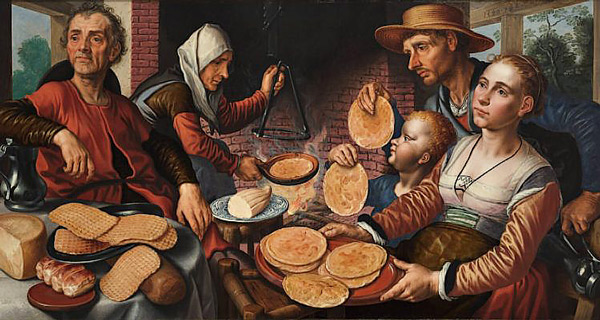
Pieter Aertszen’s The Pancake Bakery, circa 1508
Great weather and 20 in attendance on this day before Lent begins:
Photos, Feb. 13, 2024
Videos
In the Dining Room
In the Kitchen
The word “shrove” is the past tense of “shrive”, which means to confess. In the Middle Ages, this day was a time for people to confess their sins and ask forgiveness for them. This allowed Christians to enter into the season of Lent and prepare for Easter with a clean spirit.
It is also a day for frolicking – several places schedule pancake races. (We had one in 2011.) They race down streets carrying a frying pan with a cooked pancake in it and flipping it as you race.
Other names for this day include Carnival (farewell to meat) and Mardi Gras (Fat Tuesday of the French tradition). Ironically, masks play an important role in many celebrations of Carnival around the world. What a shame that we can’t gather in person in our masks for a real Carnival celebration!
It is believed that Pancake Day/Shrove Tuesday started in 1445 in Olney. Olney is in Buckinghamshire, England. A lady was getting carried away with making pancakes when she heard the church bells for the Shrove Tuesday mass. She was late! The lady ran to the church with all of her pancakes and that’s where the pancake tradition started.
Shrove Tuesday was the day for consuming dairy products. By giving up dairy products, people marked Jesus’ 40 days and nights in the wilderness. This custom is a remnant of an earlier tradition in which people prepared for the Lenten fast by using up food in their homes that they would not be eating during the season of Lent. These ingredients were made into pancakes, a meal which came to symbolize preparation for the discipline of Lent. It is exactly 47 days before Easter.
St. Peter’s did have a King Cake for dessert.King Cake is a round cake decorated with different colored icing and sprinkles.It is said to have originated in Old World France and Spain was associated with Epiphany during the Middle Ages but evolved further to be extended to Mardi Gras, particularly as the tradition came to America. Our version is closer to the Spanish sweet bread rather than the French which is filled bread with almond creme.
Our King Cake did included a small plastic baby. A commercial bakery called McKenzie’s in New Orleans. popularized the baby trinket that was baked into cakes back in the 1950s; they were originally made of porcelain but later swapped out for an easier-to-find plastic version. Whoever gets the baby must host next year’s celebration
